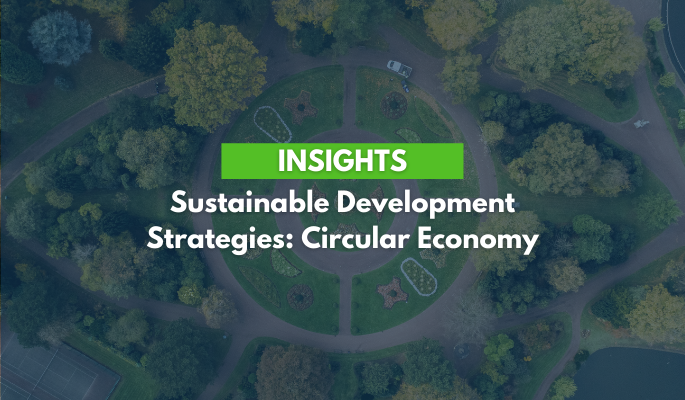
On Earth Day 2021, Capital Club Dubai hosted a panel discussion, led by Pedro Pereira, Head of Climate Action and Responsible Innovation, SAP EMEA South, on various aspects of sustainability that were part of a Circular Economy, inviting different perspectives of some local senior experts, who talked about the challenges and possible solutions in this region.
Our current way of doing life, is to take resources, make products and then throw away the waste. This is a linear model, and is no longer working for businesses, people or the environment. In fact, in June 2020, some of the world’s business leaders, policymakers, academics, influencers and others signed a joint statement calling for a transition to a circular economy.[1]
Recently, UAE become the first country to sign the World Economic Forum’s ‘Scale 360’ initiative, “an innovative model for the development of a circular economy via the use of Fourth Industrial Revolution technologies such as Artificial Intelligence, Internet of Materials and blockchain-based solutions.â€[2]
In the UAE, the government is in the final stages of launching the circular economy policy, which is an interconnected policy between the ministry of climate change, ministry of economy, the office of the minister of the artificial intelligence, ministry of industry and the advanced sciences. The circular economy policy will focus on four sectors – sustainability manufacturing, the green infrastructure, sustainability transportation, and sustainable food consumption and production.
Plastic is often seen as the proverbial villain in this space, but Antonio Miguel, Senior Vice President, Enterprise Risk Management, Mubadala, asked, “How can we promote responsible use of plastic in some applications and encourage innovation to find alternatives for the applications that have the most detrimental impact�
Anita Nouri, CEO, Business Development Director, Green Energy Solutions & Sustainability LLC., explained emphatically that plastic is not biodegradable. “Unless it’s sitting on top of the landfill and under the sun, it will not degrade. However, as soon as it gets buried, it’s there forever.†She spoke about the major issues of landfilling that is still the waste disposal method in this region and was skeptical about the energy efficiencies of incinerators that are in the plans. Waste management and the landfilling challenge is a big one for this region.
Monaem Ben Lellahom, Founding Partner and Group CEO, Sustainable Square, encouraged the audience to take a step back and reflect on why we failed in fulfilling the millennium development goals (MDGs). “The problem is that the attitude has been ‘supportive’, and this does not work. The private sector has not invested in the change agenda. The UN then changed their modus operandi and introduced the sustainability development goals (SDGs), undergirded with the message that there are trillions of dollars of business opportunities. However, the private sector still did not take the bait and continued to engage from a ‘support’ perspective through corporate social responsibility or community agendas.â€
Antonio Miguel, Senior Vice President, Enterprise Risk Management, Mubadala, said, “In many cases, ESG is one of the main value drivers. As an investor, you can encourage the company to improve its sustainability performance and, as a result, mitigate risk, have a positive impact on the financial valuation of the company and your financial return. I find that change is happening quickly and in a large scale, and, although some aspects may be driven by policy and regulation, major change is often driven by customers. A case in point is the sustainable fashion industry in Europe that grew multiple times faster than the broader retail market in 2019 before COVID. So, sustainability also presents significant investment opportunities.â€
Hussain Khansaheb, Director, Ministry of Climate Change and Environment, UAE, invited the participation of the private sector. “We believe that sustainable initiatives will come from the private sector and prefer to incentivize with many opportunities. Maybe at a later stage, some enforcements will be applied. We’ll also be launching a lot of initiatives in capacity building and incentives for the four sectors of the circular economy policy, for the private sector’s participation.â€
Pedro Pereira, Head of Climate Action and Responsible Innovation, SAP EMEA South, concluded the discussions by exhorting and encouraging the private sector. “You’ve got to be exemplary and an enabler. Let’s start by walking the talk and enabling our ecosystem, our customers, and our shareholders to be take on goals of business responsibility. There are many hidden opportunities. The Global Commission on Adaptation in 2018 found that investing US$1.8 trillion globally in five areas[3] from 2020 to 2030 could generate US$7.1 trillion in total net benefits. Do we want to risk failing to seize the economic benefits of climate adaptation with such high-return investments?[4]
[1] https://medium.com/circulatenews/a-new-measure-of-business-success-9e53b7aafafa
[2] https://www.economy.gov.ae/english/circular-economy/global-initiative/pages/default.aspx
[3] The five areas considered for this estimate are early warning systems, climate-resilient infrastructure, improved dryland agriculture crop production, global mangrove protection, and investments in making water resources more resilient.
[4] https://www.cgiar.org/news-events/news/what-can-covid-19-teach-us-about-responding-to-climate-change/

